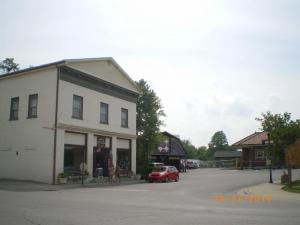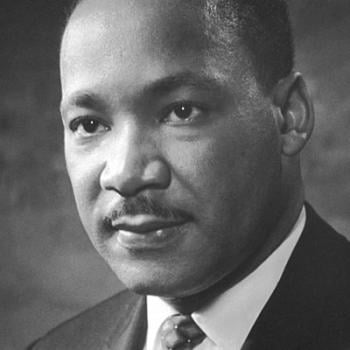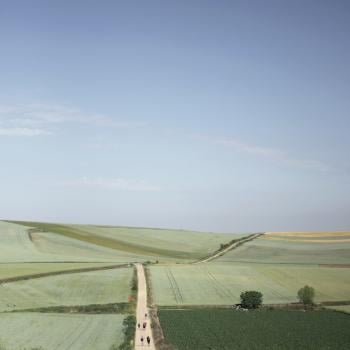
Most of the arguments I get into on Facebook are about theology or politics. And by politics I mean grand issues shaking the nation. But yesterday, for once, I got into a purely local dispute. On a group for residents of my small Kentucky town, someone asked for people to suggest new businesses that the town needs. One person replied that “brick and mortar” businesses are a thing of the past, and further that the town possibly needs to abandon its historic identity as the “arts and crafts capital” of our region. When I and others argued that this would mean abandoning what made the town special, he responded that after all the original poster had asked for “new” ideas, not “old” ones.
I don’t want to pick on this particular gentleman, who no doubt had a valid point about the way many people in my town bask in past glories. This leads them to ignore the plight of many people in the community to whom our history of artistic achievement and social radicalism seems completely irrelevant. For that matter, I am probably among the guilty in this regard. But the impulse to throw out the “old” as the solution to whatever problems a community faced is, I’m convinced, generally a mistake. And I’ve encountered this impulse in many different conversations with a lot of different people in very different contexts over the years.
Newness in church
Most often, in fact, I’ve run into it in church contexts. In mainline denominations such as the Episcopal Church, elderly church members frequently hold forth on the importance of attracting young people by doing the vague sorts of things that they suppose young people like. I heard this rhetoric particularly often in my old parish in Indiana, which when I belonged to it had a Sunday attendance of 40-50 people at best, most of them fairly elderly. One church member told me that the Sunday before my wife and I first showed up, he had remarked that what the church really needed was young, fertile women. And when my wife and I showed up the next week, in our early 30s and expecting our first child, he thought his prayers had been answered.
To be a young person in such a community is to be the focus of all the community’s hopes and fears. And that can be a terribly oppressive experience. Paradoxically, the more people in a community worry about what “the young people think,” the less likely young people are to feel welcome.
The appeal to follow the “new” and abandon the “old” is deeply rooted in American identity. And of course, fuddy-duddies like myself find this deeply distressing. But fuddy-duddies aren’t only found among the old. Indeed, I was probably more of a fuddy-duddy at 26 than I am at 46, and even more of one at 16 than at 26.
The young fuddy-duddies of Catholicism
In Catholicism, in particular, many traditionalists claim that liberalism is largely an affectation of the old, while the young are returning to the Tradition. They often exaggerate this. Many young people are quite liberal, and a large proportion of them are leaving the Church altogether. But it’s certainly true that in my parish, for instance, there’s a vibrant core of young Catholics who are deeply committed to a traditional understanding of the Faith.
And on the whole, I find that older Catholics still underestimate this. They persistently assume that young people will prefer what is new to what is old. An elderly nun I used to read to in Indiana often talked about the importance of being “modern” and was baffled by the young Dominican sisters in the convent over the hill, who walked around in heavy habits and seemed to like it. (Actually, I think that story deserves a post of its own.)
As a church organist, I find myself in the middle of the conflict when it comes to liturgical matters. I love chant and Latin and all the stuff traditionalists are supposed to love. But I am, by their standards, scandalously ecumenical and broad-minded. (This combination is much less weird in Episcopalianism.) This applies to many other conflicts I find myself in between “conservatives” and “progressives.”
My emotions and tastes, by and large, are conservative. I have a deep, visceral, negative reaction to rhetoric about “embracing change” and “not holding onto the past.” I’m sure a psychotherapist could have a lot of fun with the reasons for this. But at the same time, my conscience frequently forces me to side with “progressives” on one issue or another. I recognize that my love of the past can sometimes blind me to the needs of real people in the present.
Polarity
I’ve found Owen Barfield’s concept of “polarity” extremely helpful in navigating this tension. Polarity, as Barfield defined it, is more than balancing two things or trying to take the good parts of both. A relationship of polarity means that two apparent opposites actually include and depend on each other, so that one cannot be truly itself without the other.
The polarity of “new” and “old,” of “progress” and “conservatism,” is one of our most basic polarities. You can’t have meaningful change without continuity. For a thing to become entirely something else isn’t change, just replacement.
And at the same time, as Chesterton pointed out, you can’t keep anything the same without constant effort at renewal and preservation. As King Alfred tells his followers at the end of Chesterton’s “Ballad of the White Horse”: “If ye would have the horse of old, scour ye the horse anew.”
In the case of my small Kentucky town with a rich heritage, we have to find new ways to promote the arts in a world where brick-and-mortar galleries are closing. But the same applies to society in general, and to the Church.
One reason I became Catholic rather than Orthodox is that the Catholic Church has an account of the development of doctrine that honors both change and continuity. As a historian, I can no more believe in “unchanging orthodoxy” than I can believe that the earth is flat. (Geocentrism would be easier to swallow.) To exist in time is to change.
Community
The key insight that brought me into Catholicism is that there is no magic formula for managing the relationship between continuity and change. The relationship is itself ever-changing, ever being renegotiated. The common medium, as it were, in which this negotiation takes place is community. Towns, nations, churches are communities of people, not collections of abstract ideas. (This is something American nationalists often forget, I think. But again, that’s another post.)
If you pin your hopes for renewal on a formula like “we must open ourselves to change” you will be disappointed. You will most likely wind up changing in predictable, formulaic ways that make your community exactly like every other community and destroy what you want to preserve.
But if you nail your flag to the mast of unchanging tradition, you will find that the wood rots and crumbles, and the flag floats away.
Let us rather submit ourselves lovingly to one another. It is in our neighbor that we see, as clearly as we can in this life, the face of God. It is in our neighbor that we are likely to find such truth as we have access to in these shadowlands.
In the conversation I had on Facebook, that meant forcing myself to acknowledge that the person who called for possibly abandoning something dear to me might have a point to make. It meant trying to hear the positive insight he had to offer about the future of a community in which he has deeper roots than I do and which I am sure he loves as much as I do. I don’t claim that I did a good job of that. I responded too testily. But I’m trying to get better.
Let’s all help each other.
















